By Sarah Abed | American Herald Tribune | September 25, 2107
The Kurdistan Workers’ Party, or PKK, and its Syrian spinoff, the YPG, are cult-like radical movements that intertwine Marxism, feminism, Leninism and Kurdish nationalism into a hodge-podge of ideology, drawing members through the extensive use of propaganda that appeals to these modes of thought.
*(PKK Propaganda. Image Credit)
Abdullah Ocalan, the leader of the PKK, took inspiration from American anarchist Murray Bookchin in creating his philosophy, which he calls “Democratic Confederalism.”
The PKK spin-off group YPG represents most of the Syrian Democratic Forces (SDF) in Syria. With Western political support, they have gained popularity and garnered an impressive amount of support from anarchists and military veterans in the West, some of whom have left the comfort of their home countries to fight with the group.
One of their most productive marketing tools has been to use young, attractive female fighters as the face of the guerrillas. During their fight against Daesh, the PKK has saturated the media with images of these young female “freedom fighters,” using them as a marketing tool to take their cause from obscurity to fame. These female fighters in the YPJ are fighting alongside their male counterparts under the direction of the U.S in the SDF.
In Syria, the PKK’s goal “is to establish a self-ruled region in northern Syria,” [8] an area with a significant Arab population.
When PKK fighters cross the border into Turkey, they become ‘terrorists’, according to the United States and European Union, but when they cross back into Syria they are miraculously transformed into ‘guerrilla” fighters waging a war for democracy as the principal component of the Syrian Democratic Force. The reality is, however, that whether on the Turkish or Syrian side of the border, the PKK uses the same methods, pursues the same goals, and relies largely on the same personnel. The YPG is the PKK.
Child Soldiers forced recruitment, kidnapping, and murder by the PKK and YPG
*(Young YPJ Kurdish fighter. Image Credit)
Within the past few years Kurds have gone from almost total obscurity to front page news. What doesn’t get reported however is how these terrorist groups under the guise of being a revolutionary movement for independence have carried out numerous atrocities including kidnappings and murder – not to mention their involvement in trafficking narcotics.
Kurdish families are demanding that the PKK stop kidnapping minors. It started on April 23, the day Turkey marked its 91st National Sovereignty and Children’s Day. While children celebrated the holiday in western Turkey, the Kurdistan Workers Party (PKK) kidnapped 25 students between the ages of 14 and 16 on the east side of the country, in the Lice district of Diyarbakir.
Although the PKK has kidnapped
more than 330 minors in the last six months, the Bockum family was the first in the region who put up a tent near their home to start a sit-in protest, challenging the PKK and demanding that it return their son. Sinan was returned to the family on May 4.
Al-Monitor reported this incident from the beginning
in great detail.
As Bebyin Somuk reported in her article,
the PKK and PYD still kidnap children in Turkey and Syria. She states: “As I previously
wrote for Kebab and Camel, the PKK commits war crimes by recruiting children as soldiers. Some of the PKK militants that surrendered yesterday were also the PKK’s child soldiers. The photos clearly show that these children are not more than sixteen years old. The Turkish army
released video of the 25 PKK militants surrendering in Nusaybin.”
Thousands of children are serving as soldiers in armed conflicts around the world. In 1989, the United Nations Convention on the Rights of the Child, Article 38, proclaimed: “State parties shall take all feasible measures to ensure that persons who have not attained the age of 15 years do not take a direct part in hostilities.” Since then, UNICEF and the UN Security Council took steps to end the recruitment of children in conflict and war.
(Young Kurdish fighters. Image Credit)
The PKK, recognized as a terrorist organization by the U.S. , E.U. , and Turkey
The PKK often recruits children. In the past, the PKK even recruited children as young as 7-12 years. In 2010, a Danish national daily newspaper, Berlingske Tidende, published a story about the PKK’s child soldiers. According to that report, there were around 3,000 young militants in the PKK’s training camps. The youngest child at the PKK training camps was eight or nine years old. They were taught Abdullah Öcalan’s life story (the jailed leader of the PKK) and how to use weapons and explosives.
*(Martyrdom notice for a PYD/YPG child soldier Image Credit)
Despite the Deed of Commitment, the PKK continues to recruit minors.
After that story was published, the PKK encountered strong reactions from human rights organizations worldwide. The same year, UNICEF released a statement voicing its “profound concern” about the PKK’s recruitment of child soldiers. In October 2013, the PKK, represented by HPG (the PKK’s military wing) commander Ms. Delal Amed, signed the Deed of Commitment protecting children in armed conflict. This document, drawn up by the Geneva Call NGO, is dedicated to promoting respect by armed non-state actors for international humanitarian norms in armed conflict. Despite this commitment, the PKK continued to recruit minors.
The People’s Defence Forces is the military wing of the Kurdistan Workers’ Party. Image Credit
The PKK abducted children while the peace process was continuing
On March 21, 2013, PKK leader Abdullah Öcalan called for a cease-fire that included the PKK’s withdrawal from Turkish soil and an eventual end to armed struggle. The PKK announced that they would obey, stating that 2013 would be the year of conclusion, either through war or through peace. But that did not happen. Instead, the PKK
abducted 2,052 children aged between 12 and 17 while the peace process was still going on, according to Turkish security records. The PKK took these children and trained them. After that, because those
childrenwere not involved in any criminal activities, when they were
captured by, or surrendered to, Turkish security forces, Turkish courts did not prosecute them, so most of them were released. It was the Turkish state’s goodwill gesture for the sake of the peace process.
However, once released, most of these children joined the YDG-H, the PKK’s new youth wing, and began to perpetrate illegal and/or violent events in Kurdish populated cities and towns. The YDG-H began to emerge in early 2013 and spread rapidly after the peace process’ beginning. Then, after the 7 June 2015 election, the YDG-H began to attack security forces and civilians in cities and towns such as Cizre, or in Diyarbakır’s Sur neighborhood, with heavy weapons, and to dig trenches and erect barricades in side streets.
*(YDG H. Image Credit)
A growing number of Kurdish families in Turkey are calling for the return of their children, who they say have been abducted by the Kurdish rebel group, the PKK. The PKK denies the claim, but with the Turkish prime minister stepping in, the issue is putting pressure on an already stalled peace process. Dorian Jones reports from Diyarbakir, the main city in Turkey’s predominantly Kurdish southeast.
The HDP assaulted the mothers demanding their children
In May 2014, mothers from across Turkey whose children had been recruited by the PKK held a sit-in protest in front of the Diyarbakır Metropolitan Municipality building and called on the PKK to release their children. Their children were mostly 14-15 years old at that time. Some families claimed that their sons and daughters were kidnapped by the PKK against their will. The Diyarbakır Municipality, administered by the HDP, used water cannon to disperse the mothers. HDP Co-Chair Selahattin Demirtaş even claimed that these mothers were hired by the Turkish National Intelligence Organization. Despite the resistance coming from the PKK and the HDP, the families continued their protest, and some families’ children were released by the PKK.
The PKK established a child-wing called YPS-Zarok
Another photo from the Yüksekova district
shows the child-wing recently established by the PKK called YPS-Zarok (Child) with the headline “YPS-Zarok announcement from the children of the resistance.” The PYD, the PKK’s Syria branch, is also
known for its recruitment of child soldiers.
*(YPS. Image Credit)
U.S.’s “reliable partner” the YPG also recruits children
A Human Rights Watch
report, “Syria: Kurdish Forces Violating Child Soldier Ban” provides a list of 59 children, ten of them under the age of fifteen, recruited for YPG or YPJ forces since July 2014. International humanitarian law and the Rome Statute that set up the International Criminal Court classify the recruitment of under-15-year-olds as a war crime. While the Obama Administration does not recognize the YPG as a terrorist organization, and supports them as a local partner in the region, the YPG continues to
recruit child soldiers.
It’s clear that the U.S. sees the PYD as a “reliable partner” in the fight against ISIS. However, the Obama Administration should notice the fact that the PYD is not an independent organization. It is linked to the PKK and recruiting minors under 18. The decision to found the PYD
was made in 2002 during a PKK congress in Qandil. The PYD also has a bylaw stating that “Abdullah Öcalan is the leader of the PYD.”US Special Forces Delta Force, training PYD (Image
Credit)
In summary, the YPG is the Syrian wing of the PKK, and recruits children just like the PKK. Regardless of what acronym they go by, whether it be the YPG, PKK, PYD, YPJ or any of the other alphabet soup combinations, they commit crimes against civilians in both Syria and Turkey all with the arms, funds, and training received from the United States.
Female PKK Killing Turkish Soldiers
SouthFront reported on female PKK fighters who have killed Turkish soldiers. “The women fighters command of the Kurdistan Worker Party (PKK) have released a statement, claiming PKK female fighters killed 160 Turkish military servicemen in 2016. According to the statement, the women fighters command of the PKK carried out 115 operations against Turkish government forces in 2016. The group also vowed to ‘proceed the struggle during the new year for a life of freedom and until victory is achieved.’”
*(Hundreds of people protest against the PKK in Istanbul on 7 September after the PKK killed 16 soldiers and wounded six others in Daglica, Turkey. Image Credit)
“Senior PKK leader Cemil Bayık, in an interview with the Fırat News Agency (ANF) on Aug. 8, said, ‘Our war will not be confined to the mountains like it was before. It will be spread everywhere without making a distinction between mountains, plains or cities. It will spread to the metropolises.’ Terrorist Bayık’s statement signaled that the PKK would take increasing aim against civilians, targeting civilian areas more than ever. And it is happening.
Since July 15, the day when the Gülenist terror cult, FETÖ, launched its failed military coup attempt to topple the democratically-elected government, the PKK perpetrated dozens of terrorist attacks, killing 21 civilians and injuring 319 others – most of them Kurdish citizens.”
On November 18, FBI Director Robert Mueller met with senior Turkish officials to address U.S.-Turkish efforts targeting the Kurdistan Workers Party (PKK), also known as Kongra-Gel. A press release from the U.S. embassy in Ankara following the meeting stressed that U.S. officials ‘strongly support Turkey’s efforts against the PKK terrorist organization’ and highlighted the two countries’ long history of working together in the fight against terrorism and transnational organized crime.
The PKK: Terrorist Organization and Foreign Narcotics Trafficker
These discussions are timely. Despite Ankara’s recent bid to alleviate the Kurdish issue — a bid referred to as the ‘democratic opening’ — the PKK is one of a growing number of terrorist organizations with significant stakes in the international drug trade.
In October, the U.S. Treasury Department added three PKK/Kongra-Gel senior leaders to its list of foreign narcotics traffickers. The PKK, along with the Revolutionary Armed Forces of Colombia (FARC), is one of only a few organizations worldwide designated by the U.S. government as both a terrorist organization and a significant foreign narcotics trafficker.” Drug smuggling is reported to be the main financial source of PKK terrorism, according to the organization International Strategic Research, whose detailed report can be seen
here.
Western Veterans Blindly Supporting Kurdish Independence
Their exaggerated triumphs against Daesh have helped them evolve from a radical militia to an alleged regional power player. Have they been successful in fighting against Daesh in Syria? Yes – but while the Syrian Arab Army has been more effective, it does not receive a fraction of the praise or recognition that the PKK does.
Although initially interested in their desire for autonomy, he soon got to know a different side of the group.
An Exclusive Eyewitness Account of an American who Trained with the Kurdish Syrian Rebels
Getting retired from the United States Marine Corps at age 23 with zero deployments under my belt was a huge blow to what I figured to be my destiny on this planet. That “retirement” came in 2010 after three years on convalescent leave, recovering from a traumatic brain injury sustained stateside. I got my chance to vindicate myself in 2015 by volunteering to fight in Syria with the Kurdish Yeni Parastina Gel (YPG), or the “People’s Protection Units” in Kurmanji (Northern Kurdish language).
The YPG is the military apparatus of the Partiya Yekitiya Democrat (PYD), the Democratic Union Party, and one of the main forces of the Syrian Democratic Forces fighting ISIS and Bashar al-Assad’s regime. While they are a direct ideological descendant of the Soviet Union, their take on Marxism has a much more nationalistic bent than that of their internationalist forebears. At their training camp that I attended, they constantly spoke of their right to a free and autonomous homeland–which I could support. On the other hand, they ludicrously claimed that all surrounding cultures from Arab to Turk to Persian descended from Kurdish culture. One should find this odd, considering that the Kurds have never had such autonomy as that which they struggle for. All of this puffed up nationalism masquerading as internationalism was easy to see through.
The Westerners were treated with respect by the “commanders” (they eschewed proper rank and billet, how bourgeoise!), but the rank and file YPGniks were more interested in what we could do for them and what they could steal from us (luckily, my luggage was still in storage at the Sulaymaniyah International Airport in Sulaymaniyah, Iraq). By “steal from us,” I mean they would walk up to a Westerner/American and grab their cap, glasses, scarf and whatever else they wanted and ask “Hevalti?” which is Kurmanji for “Comraderie?” and if you “agreed” or stalled (a non-verbal agreement) then they would take your gear and clothing. “Do not get your shit hevalti-ed,” the saying went.
Not only was their idea of Marxism fatuous, their version of feminism was even worse. We had to take mandatory “Female World History” classes in which some putrid fourth or even fifth wave feminist propaganda was espoused. Early on in my brief stay with this “military unit”, I was told not to ever brush my teeth in front of a woman as that might “sexualize” her… … something to do with preparing one’s self for sex or something.
They insisted that we chicken-wing our elbows while sighting in on targets–the same targets that were fired on by everybody in the class, thus making an assessment of individual strengths and weaknesses rather impossible. This was on the ONE day that we went to the range–one day with the AK-47 out of about a month of training. Another day was Some of these guys were straight from civilian life, with only their blood composition to act as a reason for them to be there. Little boys and little girls as young as 13 or 14 were there–reason enough for me to leave.
During one long “Female World History” class, we were taught that if a man had a Dragonov (sniper rifle) and he was elevated from his female comrade’s position and she had a Bixie, they the male in the scenario should not cover his female comrade, but instead should find something else to do lest she lose self esteem, not feeling capable of carrying out the task by herself.
When a student from Kentucky asked, “What if the situation is reversed–can a woman cover a man?” the female instructor smiled and said, “Yes, that’s okay.” I didn’t end up firing a shot in combat for the YPG. After seeing their half-baked ideology, poor level of training, and the child soldiers, I had had enough. They were nice enough to arrange for me to go back to Iraq where I could catch a ride to Turkey.
*(Pat Rincon with YPG fighters in Syria. Image Credit)
Accounts such as this will certainly not make it to mainstream media, as they do not fit the narrative that the Kurds and their sponsors promote.
In another example of Western support for the YPG,
Joe Robinson, an ex-soldier and UK national, recently returned to the UK after spending five months in Syria fighting with the group. He was detained and arrested by Greater Manchester Police officers on suspicion of terrorism offenses as soon as he returned. He joined the British military when he was 18 and toured Afghanistan with the Duke of Lancaster’s Regiment in 2012.
*(Joseph A. R. (right) in a military outfit with flag patches of Kurdistan and the UK, while men who appear to be Kurdistan Region’s Peshmerga forces are seen in the background in this undated social media picture. Picture Credit).
He left the UK when an arrest warrant was issued after he failed to appear in court. Robinson is pictured here in Syria with YPG fighters.
Robinson, at left, holding his weapon while fellow YPG comrades hold Daesh flag. The writing on the wall speaks volumes about the relationship between Israel, the Kurds and the US.
During a trip to Turkey Joe Robinson was arrested for having been part of the YPG.
*(Turkish police arrested Joesph A.R. (center) along with two Bulgarian women in the city of Aydin, July 28, 2017. Photo Credit)
“I received arms training from the YPG [People’s Protection Units] for three months but never engaged in combat,” said the foreign fighter during an
interrogation.
The information contained in this article serves the purpose of balancing all of the propaganda and romanticization that these Kurdish terrorist groups have received in mainstream media. The bottom line is they are armed, dangerous, and committing crimes with international support. Support for these terrorist groups needs to end immediately before further division, chaos and death spreads in the region
River to Sea Uprooted Palestinian
Uprooted Palestinian 
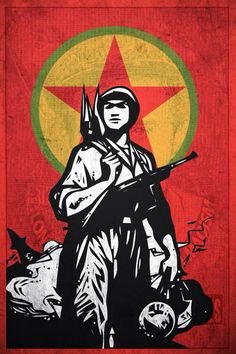
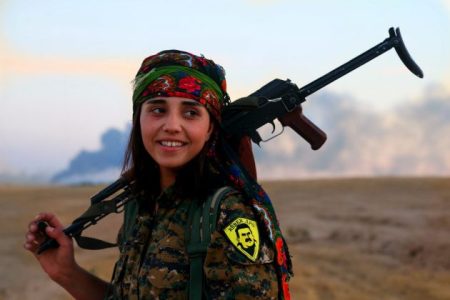
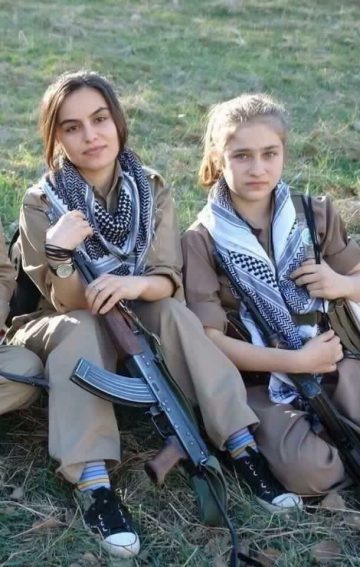
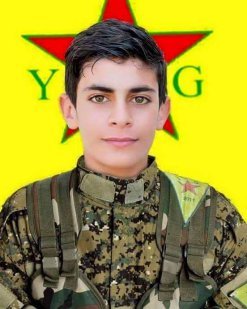

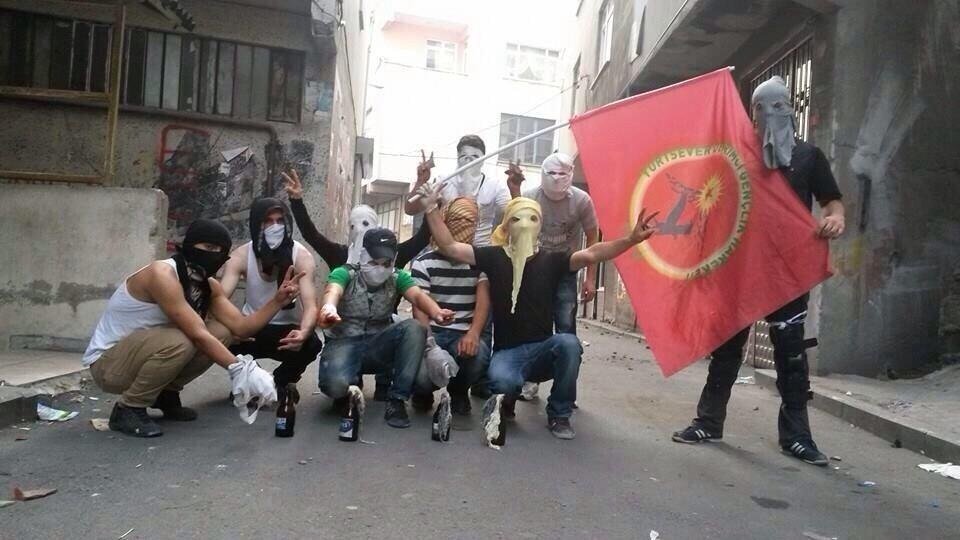
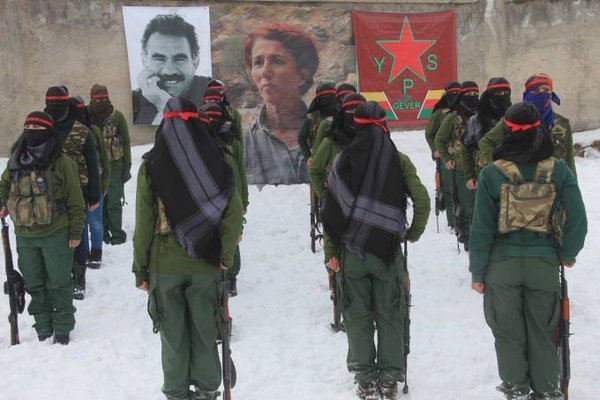
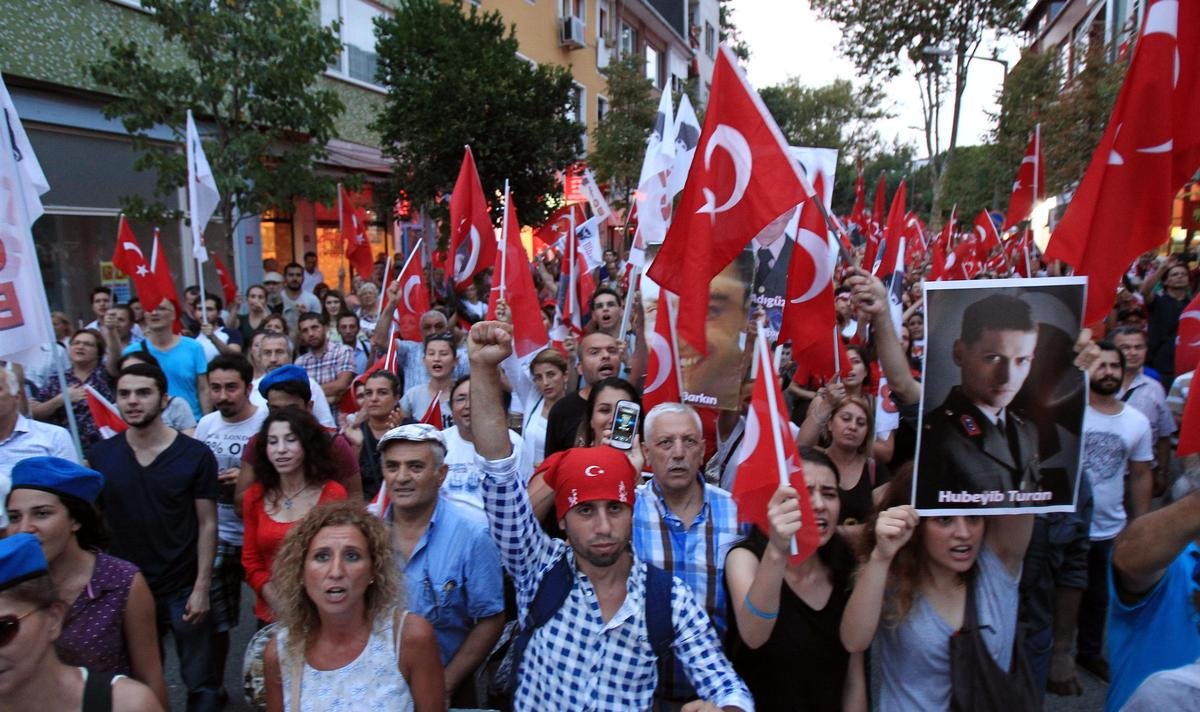
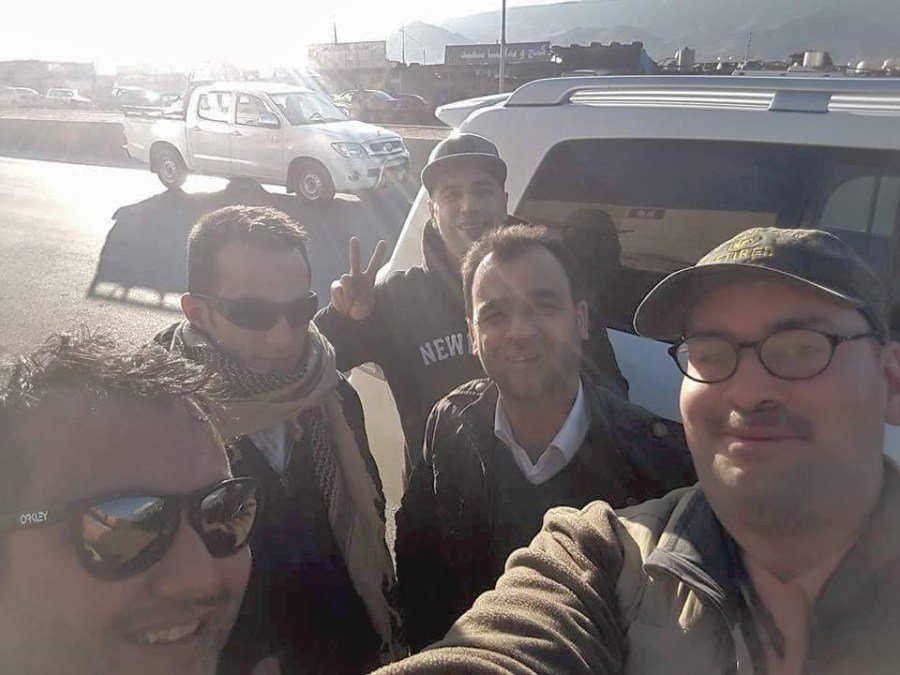
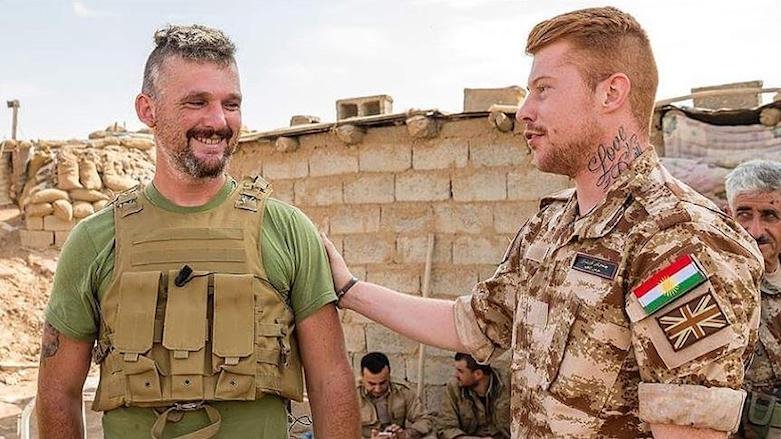
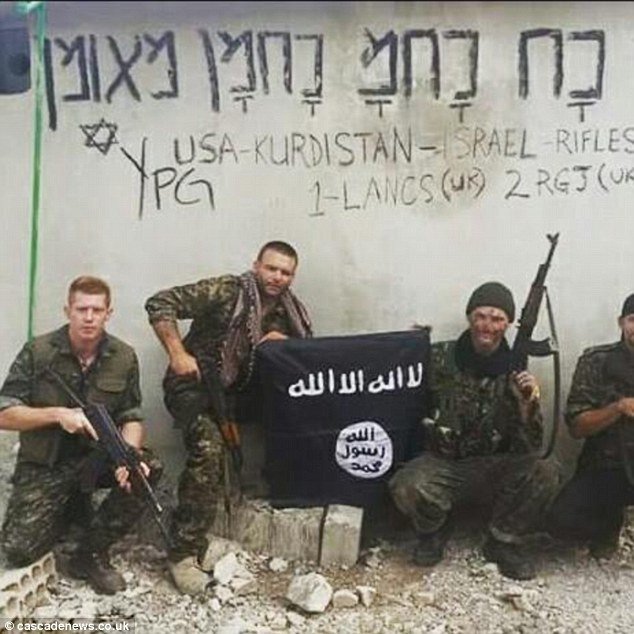
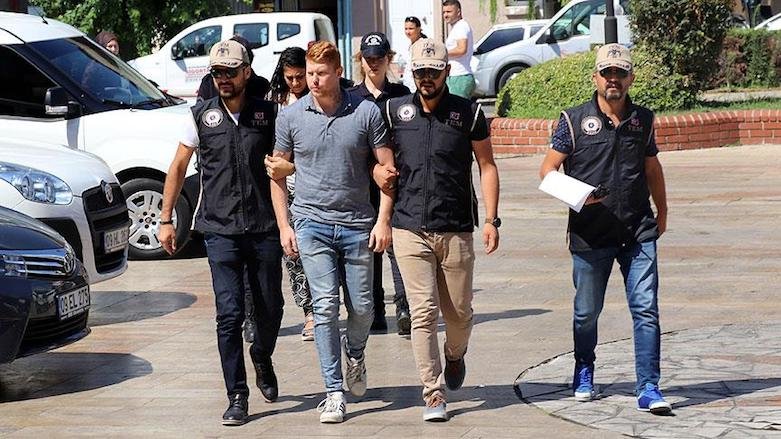













No comments:
Post a Comment